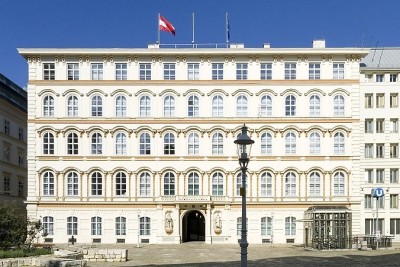Austrian Foreign Ministry Opens Regional Forum On Minority Issues
On the occasion of the 30th anniversary of the United Nations Declaration on the Rights of Minorities, the Secretary-General Peter Launsky-Tieffenthal of the Ministry of Foreign Affairs, together with the UN Special Rapporteur in charge, Fernand de Varennes, organized the Regional Forum on Minority Issues in Europe and Central Asia.
 The Ministry of Foreign Affairs organized the Regional Forum on Minority Issues in Europe and Central Asia. / Picture: © Wikimedia Commons / Gugerell / CC0
The Ministry of Foreign Affairs organized the Regional Forum on Minority Issues in Europe and Central Asia. / Picture: © Wikimedia Commons / Gugerell / CC0
Minority rights are an important question that every democracy has to face, especially in times of war like now.
Ukraine as a state with many peoples, but also other countries with various ethnic minorities, is facing new challenges. The rights of minorities must be respected and the particular problems that minorities face must be addressed.
Europe and Central Asia are home to many peoples. Many more peoples than the nation-states of these regions alone can name.
According to the Austrian Foreign Ministry, the triple threat of violence during the last 10 years, mainly from ethnic, religious, cultural, or linguistic backgrounds, shows that minority conflicts are not a thing of the past. Considering the current status quo of the Ukrainian conflict, the Russian war of aggression shows the importance of such debates about minority rights.
The forum was organized to mark the 30th anniversary of the UN Declaration on the Rights of Minorities. The Austrian Ministry of Foreign Affairs, together with the UN Special Rapporteur in charge, Fernand de Varennes, organized this Regional Forum on Minority Issues in Europe and Central Asia.
Throughout Europe's history, it showed no good that any individual or group is vilified for their affiliation. Minority rights violations are warning signs of conflict and instability. The promotion and protection of minority rights are therefore at the core of the Austrian human rights agenda.
The forum was opened by the Secretary-General for Foreign Affairs, Peter Launsky-Tieffenthal.
Secretary-General Launsky-Tieffenthal underlined Austria's role in strengthening and developing the legal system for the protection of minorities.
For example, Austria introduced several measures and policies to counter anti-Semitism and the government reaffirmed its efforts to secure the continued existence of Jewish life in Austria in the long term, as reported by Vindobona.org.
According to the Austrian Foreign Ministry, the office of the UN Special Rapporteur on Minority Issues was created by an Austrian initiative, and the annual UN Minority Forum and the 1992 UN Declaration on the Rights of Minorities - to date the only comprehensive and global document on the rights of ethnic, national, religious or linguistic minorities - also stem from an Austrian initiative.
Other speakers included OSCE High Commissioner on National Minorities Kairat Abdrakhmanov, Governor of South Tyrol Arno Kompatscher, and Director of the European Union Agency for Fundamental Rights Michael O'Flaherty.
The Forum will share best practices, challenges and opportunities to fight against the marginalization of minorities across Europe and Central Asia. The Forum provides a platform for promoting dialogue and cooperation on issues related to national or ethnic, religious and linguistic minorities. The 2022 Regional Forum will follow three regional forums on "minority language rights" (2019), "hate speech" (2020) and "conflict prevention" (2020).
The importance of minority rights and the concerns of minorities is extraordinary in such difficult times as now. It is good and important that efforts are made to address the problems of minorities and even more important for democracy to solve these problems.



